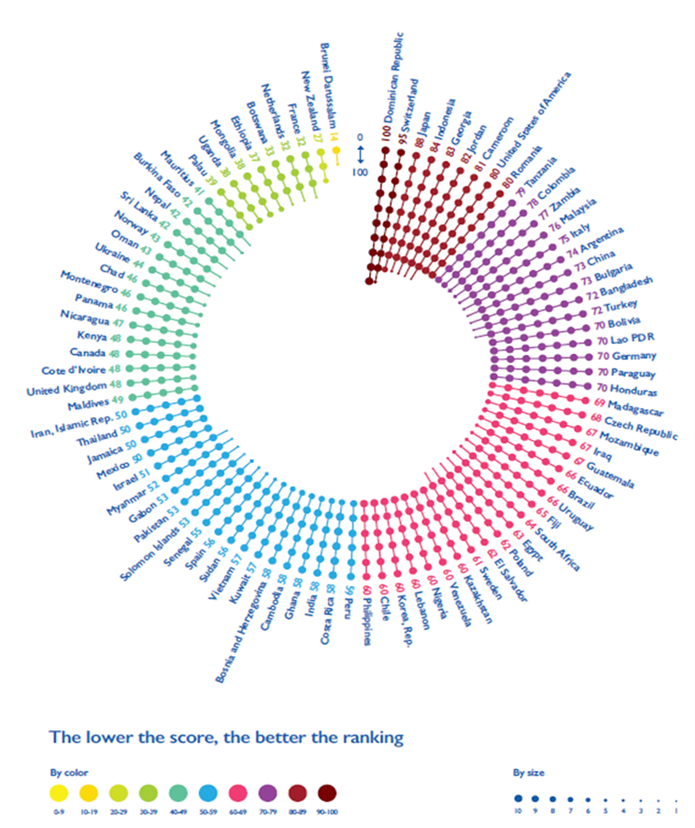Mary Assunta
The tobacco industry (TI), that peddles harmful and addictive products globally, has intensified its interference to sabotage and undermine public health policy. Many governments succumbed to its influence mainly because they failed to act cohesively when dealing with the industry and its tactics. No country has been spared from the interference and there is a worsening trend as more countries deteriorated in their efforts in 2023 compared to countries that improved.
This is the main finding of the Global Tobacco Industry Interference Index 2023, the fourth in the series, which ranked 90 countries (Figure 1) on how they were implementing Article 5.3 of the WHO Framework Convention on Tobacco Control (FCTC). Article 5.3 is an obligation in the Convention which requires Parties to protect their tobacco control policies from commercial and other vested interests of the industry. Using the 2014 questionnaire developed by the Southeast Asia Tobacco Control Alliance (SEATCA), this civil society report applies scores based on evidence covering the period 1 April 2021 to 30 March 2023 to a country’s performance: the lower the score, the lower the level of interference.
The top five countries that did not cave-in to industry meddling in tobacco control policy are Brunei Darussalam, New Zealand, France, the Netherlands and Botswana. These countries, being from different regions and varying economic status, indicate it is political will that is needed to protect public health. At the other end of the spectrum are the Dominican Republic, Switzerland, Japan, Indonesia and Georgia who all faced high levels of industry interference. Their high scores indicate they acted in favour of the industry.
Non-health sectors vulnerable to tobacco industry lobby
The 2023 Index found the TI used a slew of tactics to overwhelm and undermine protective measures governments have already put in place, while preventing and discouraging other efforts from being adopted. The industry targeted non-health departments, especially finance, commerce and customs, persuaded them with exaggerated claims of its contributions to the economy and convinced them of the narrative that tax increases will worsen illicit trade. These strategies contributed to preventing tax increases in Colombia, Mongolia, Malaysia and Turkey, while in several other countries, there were delays in tax payments.
Applying pictorial health warnings on tobacco packs, a cost-effective measure to educate smokers, promote cessation and dissuade new smokers form starting, were delayed in Chad, Bangladesh, Lao PDR and Nigeria. The implementation of standardised tobacco packaging was undermined by the TI in Georgia, Myanmar and Uruguay.
Uruguay, Egypt and Kenya, succumbed to the industry’s lobbying and revoked their bans on e-cigarettes and nicotine pouches.
Accepting tobacco related charity facilitates unnecessary interaction and compromises
The TI’s corporate social responsibility (CSR) activities are a form of sponsorship and governments are called to denormalise these CSR activities. When governments accept charity from the industry, they subject themselves to compromise on policies. Many governments accepted charitable handouts which focused on post COVID-19 recovery, contributing to relief efforts in natural disasters, environmental protection such as cigarette butt cleanups or tree-planting.
Government and public institution endorsed industry-led cigarette butt litter clean-ups occurred in at least 15 countries including Brazil, Colombia, Costa Rica, Korea, Malaysia, Sweden, Switzerland and Uruguay.
Article 5.3 calls on governments to limit interaction with the TI to only when strictly needed for regulation. But many countries engaged in various types of unnecessary interactions. High ranking public officers in at least 12 countries, including Korea, Bangladesh, Nepal, Turkey, Lebanon and Japan, gave special recognition to tobacco companies just for paying taxes, doing charity or conducting its business.
In 2014, Parties to the WHO FCTC adopted a decision to strengthen their efforts to protect policies from the TI to include diplomatic missions. The 2023 Index found the diplomatic missions of five countries, namely, China, Germany, Italy, Japan and the UK, were persuaded to promote tobacco companies in other countries.
Policy makers in many countries made themselves vulnerable to industry interference by placing themselves in situations of conflict-of-interest. This happened either through accepting TI donations for political campaigns or through governments investment in the tobacco business.
Transparency and accountability remained a problem across countries as most countries do not have rules for disclosure of meetings with the TI, a register of lobbyists, or policies to require the TI to disclose information on marketing and lobbying. However, Canada, Chile, Mexico, the Netherlands, Poland, and the U.S.A. have a register for lobbyists.
Canada, the EU, New Zealand, and the UK inform about meetings with the TI on their websites.
Some governments took action to halt industry interference
But concrete government action to address industry meddling was registered in several developing countries. In Africa, Botswana, Burkina Faso and Ethiopia stepped-up their efforts to protect public health. Botswana passed its Tobacco Control Act 2021 which incorporated elements of Article 5.3 Guidelines and requires full transparency on any interactions with TI, limited to only when strictly necessary, and prohibits any partnership or contributions from the TI to any public body. The new law was passed despite intimidation by British American Tobacco Botswana (BATB) to the Health Minister that that the regulation was “excessive and ill thought-out”. Burkina Faso and Cote d’Ivoire have developed draft decrees to protect health policies from industry interference.
In Europe, Bosnia and Herzegovina’s new tobacco control law incorporates components of Article 5.3 and limits interactions with the TI and the Netherlands has a protocol for civil servants interacting with the industry and its representatives. The Ukraine registered the biggest improvement by implementing comprehensive policy to reduce tobacco use and countered industry attempts which continued during the war to delay that law and reverse a ban on tobacco product advertising.
Article 5.3 is a powerful tool that empowers governments to halt TI interference in tobacco control policy. They need to exercise political will and fully utilize it to save lives.
Mary Assunta is the Head of Global Research and Advocacy at Global Center for Good Governance in Tobacco Control and the Senior Policy Advisor at the Southeast Asia Tobacco Control Alliance.
